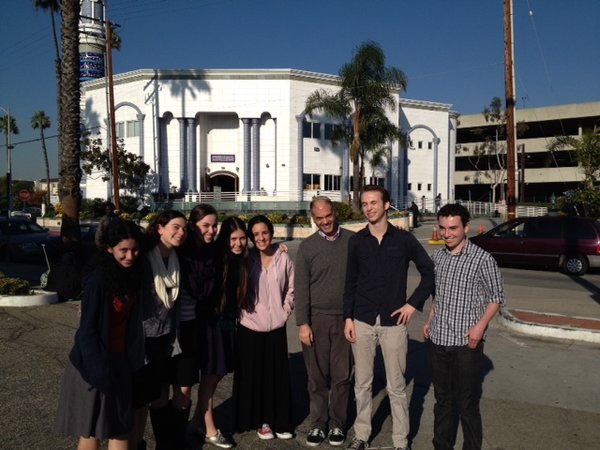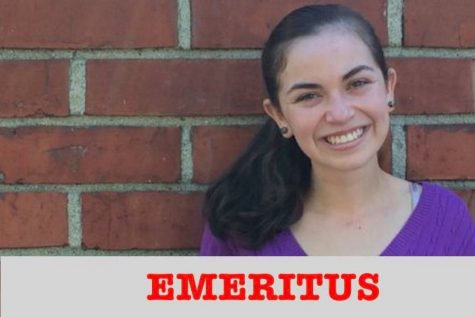On mosque visit, class views a different culture of the Middle East

INTERFAITH: Juniors stand in the library of King Fahad Mosque in Culver City after spending the afternoon observing prayers and the imam’s sermon Dec. 20.
January 12, 2014
Seven juniors spent an afternoon looking at Middle Eastern culture through the lens of a local mosque, on a field trip last month to Culver City that was part of their Modern Middle East class.
Jewish History teacher Mr. Jason Feld brought the students to the King Fahad Mosque, located on Washington Boulevard, Dec. 20 to observe afternoon prayers, called dhuhr. They watched from the back of the room as hundreds of Muslims listened to the imam’s sermon and took part in their holiest prayer of the week — Friday being the Muslim “gathering day” when congregational prayer is required.
“As a Zionist, I believe before one can appreciate the potential for going home, one has to actually experience feeling at home,” said Mr. Feld. “The best way to do that is to peel away the veneer of cultural differences that separate us from the broader Middle East.”
The class has spent the year learning about Zionism and the many diverse cultures within Israel and the Middle East. Mr. Feld hopes that his students will spend a year in Israel after high school, and that they will understand the culture when they are there.
“My hope is that when my students spend time in Israel, they experience first hand a lot of the crazy stuff we learn about in Modern Middle East, and that they do so with confidence and respect,” said Mr. Feld.
Mr. Feld contacted one of the directors of the mosque, Nour al Rayes, to arrange the visit.
When it was time for dhuhr, students removed their shoes according to the rules of the mosque. The girls went upstairs to the women’s balcony, and the boys remained downstairs. Nelson Mandela had recently died, and before the prayers began, the imam spoke about Mandela’s emphasis on peace, telling the congregants that they should never rely on vengeance.
Both before and after the service, the worshippers were generally interested in talking to the visitors from Shalhevet, asking about Jewish synagogues and schools. But once upstairs in the women’s section, some of the Muslim women criticized the Shalhevet students’ lack of long skirts, and handed them cloths to cover their knees.
“I didn’t expect the women to chastise us, since we were sitting silently in the back,” said junior Shana Chriki. “I definitely don’t blame them, though.”
After prayers, students went across the street to the mosque’s youth center for a question-and-answer session with one of the mosque’s active members, Mohammed Akbar Khan. Students asked him about Muslim culture, religion, and his views on Judaism.
He said he tries to understand each monotheistic religion from the point of view of the believers themselves.
“Most people don’t realize how similar Islam and Judaism actually are,” Mr. Khan said.
The King Fahad Mosque was built in 1995 with funds sent by King Fahd of Saudi Arabia in 1995 and is affiliated with Wahabi Islam. Wahab’ism was the religion of the 9/11 hijackers, and the Culver City mosque is mentioned in the Report of the 9/11 Commission as a place where three of the hijackers received aid and made friends when they first arrived in the U.S. in 2000.
(The report does not suggest that the hijackers’ friends knew what they were planning, however. In fact, it says they were sometimes asked to leave the room so the future hijackers could speak privately.)
According to Mr. Feld, the Muslim community views the mosque as “fairly traditional.”
“It was very mind-opening because we got to see a very different perspective,” said junior Margo Feuer Margo. “But even though he was really welcoming, we still can’t take Mohammed’s opinion as the face of Islam because there are many people who aren’t as tolerant of other religions.”
Students had to miss the last two periods of school — when AP classes are held — to attend. For that reason, three who had originally planned to go stayed back.
But Mr. Feld thought it was a success and hopes to bring more students to the mosque in the future.
“A lot of juniors have difficulty finding the time in their schedules to go on even the shortest adventures with me,” said Mr. Feld. “I hope to take more if the interest is there.”
This story won a National Award for News Writing in the 2014 International Writing and Photo Contest of the Quill and Scroll Society, judged by the American Society of News Editors.













